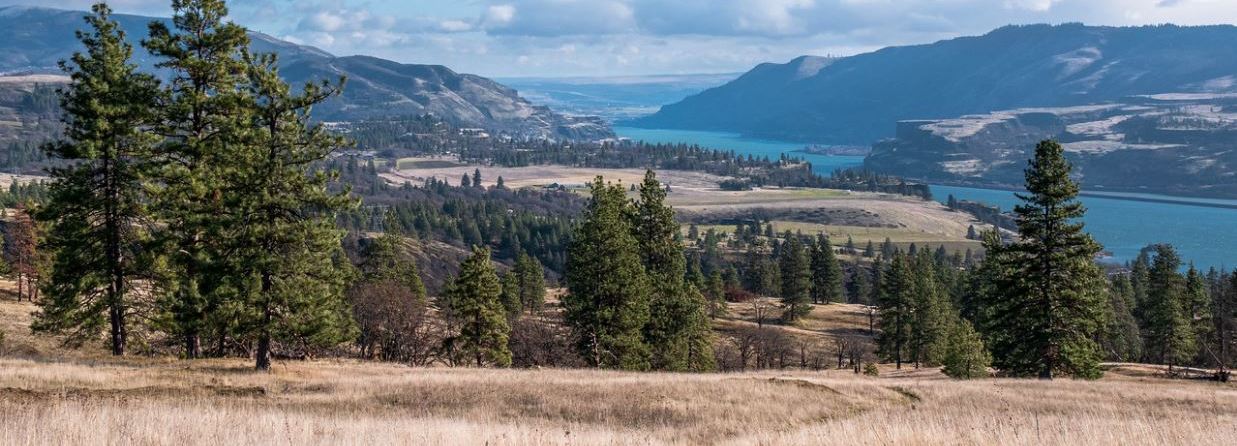In 2020, the largest point source of climate pollution in Oregon, the Boardman coal power plant, was finally shuttered through a court supervised consent decree. This victory resulted from a dedicated, combined campaign started in 2005 by Friends of the Columbia Gorge and allies including the Sierra Club, Columbia Riverkeeper, and others to stop development of energy projects and fossil fuel terminals that would harm the Gorge and contribute to climate change.
A legacy of stopping fossil fuel projects
 In 2011, Friends led efforts to stop construction of the Troutdale Energy Center, a fracked-gas power plant proposed at the mouth of the Sandy River, the gateway to the Columbia River Gorge National Scenic Area. We also worked with many allies to stop several coal and oil terminals from being built on the Columbia River and throughout the region and to pass legislation to reduce the dangers of transporting crude oil by rail through Oregon and Washington. Had these multiple projects gone unchallenged, the cumulative effects would have been devastating to the region and would have substantially contributed to worsening climate change.
In 2011, Friends led efforts to stop construction of the Troutdale Energy Center, a fracked-gas power plant proposed at the mouth of the Sandy River, the gateway to the Columbia River Gorge National Scenic Area. We also worked with many allies to stop several coal and oil terminals from being built on the Columbia River and throughout the region and to pass legislation to reduce the dangers of transporting crude oil by rail through Oregon and Washington. Had these multiple projects gone unchallenged, the cumulative effects would have been devastating to the region and would have substantially contributed to worsening climate change.
While greenhouse gas emissions were a major concern, for the most part these projects were not stopped due to climate impacts, as state laws did not yet exist to regulate carbon emissions. This is changing, as projects in Washington State are subject to its State Environmental Policy Act and recently passed Climate Commitment Act, which will create a statewide system to cap carbon pollution and set limits for individual businesses.
Oregon lags behind
Unfortunately, Oregon does not have a state environmental policy act, and a comprehensive analysis of environmental impacts of energy projects, including climate impacts, is not available. While the Oregon Global Warming Commission’s 2018 Report to the Oregon Legislature warned of dire state impacts—including to the agricultural, forestry, and fishing industries—the Oregon Senate’s Republican caucus has walked out of sessions repeatedly when faced with passage of comprehensive climate legislation.
Governor Brown’s executive order on climate
In 2020, Oregon Governor Kate Brown issued Executive Order 20-04, directing “state agencies to take action to reduce and regulate greenhouse gas (GHG) emissions toward meeting reduction goals of at least 45 percent below 1990 emissions levels by 2035 and at least 80 percent below 1990 levels by 2050.” The governor’s order specifically directs the Oregon Department of Energy (ODOE) “to exercise any and all authority and discretion to help facilitate Oregon’s achievement of the GHG emissions reduction goals set forth in the EO.” ODOE is also directed to consider and integrate climate change, climate change impacts, and Oregon’s greenhouse gas emissions reduction goals into its planning, budgets, investments, and policy making decisions.
Oregon DOE business as usual
 Despite this order, the Oregon Energy Facility Siting Council (EFSC), staffed by ODOE, continues to approve fossil fuel energy projects, disregarding climate impacts, the governor’s executive order, and their own rules.
Despite this order, the Oregon Energy Facility Siting Council (EFSC), staffed by ODOE, continues to approve fossil fuel energy projects, disregarding climate impacts, the governor’s executive order, and their own rules.
Recently, ODOE concocted an illegal scheme to revive an otherwise-dead fracked gas power plant proposed in Hermiston, called the Perennial Wind Chaser Station. In an attempt to keep the project permit from expiring, ODOE unilaterally altered the previously approved construction schedule for the project and purported to waive numerous mandatory pre-construction conditions in the permit. ODOE did so without first obtaining approval for these changes from EFSC, as required by state law. ODOE then allowed Perennial to start work on a road and bridge at the site, despite Perennial’s noncompliance with the permit.
With our ally Columbia Riverkeeper, Friends sought judicial review against ODOE and Perennial in the Multnomah County Circuit Court, alleging that ODOE’s decisions violated state law. ODOE and the Perennial developer both filed motions to dismiss the case. Incredibly, ODOE attorneys made a cynical argument that the issue of climate change is merely a “political choice” that does not harm Friends and Riverkeeper or give us standing to sue. We couldn’t disagree more.
Not dead yet
In early April 2021, a day before oral arguments on the motions to dismiss, a Perennial attorney notified the Circuit Court that the gas plant would no longer be built, that Perennial would ask EFSC to terminate the permit and would withdraw its motion to dismiss. Then, in a stunning reversal just two weeks later, the company announced that they want to go ahead with the project after all, claiming that a prospective buyer for the project had emerged.
All of this could have been avoided if ODOE had followed the law, adhered to the executive order, and allowed the EFSC permit for this project to expire. At this point, the future of Perennial’s project remains uncertain.
Friends will continue to fight against new fossil fuel power plants being built in areas that would harm air quality in the Columbia Gorge. We are fully committed to ensuring that the Gorge is protected from the escalating effects of climate change.
Stay updated on Gorge conservation threats and take action: Receive conservation advocacy text alerts. Sign up here or text "gorgefriends" to 52886.


